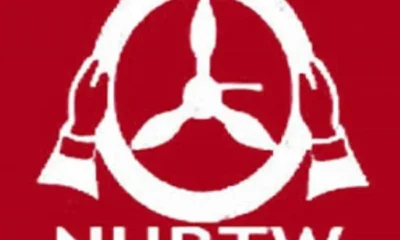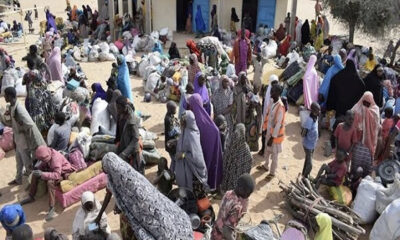Latest News
IPOB: There’ll be one-month lockdown in south-east if FG fails to bring Kanu to court

The Indigenous People of Biafra (IPOB) says the south-east region will go on a one-month lockdown, if the federal government fails to bring Nnamdi Kanu, its leader, to court on October 21.
On July 26, Binta Nyako, judge of the federal high court, Abuja, adjourned the trial of Kanu till October 21, owing to the failure of the federal government to produce him in court.
In June, Nnamdi Kanu was arrested and extradited to Nigeria to face trial. He was remanded in the custody of the Department of State Services (DSS) after he was re-arraigned before the judge.
On August 9, the proscribed group announced the enforcement of a lockdown every Monday until Kanu is released but later suspended the directive, a few days later.
Reacting, IPOB, in a statement, by Emma Powerful, its spokesperson, alleged that the federal government has perfected plans not to bring Kanu to court on the next adjourned date.
The group said its “peaceful resolution” towards the trial of Kanu should not be misconstrued as weakness, while stressing that there will be one month lockdown in the south-east, if the federal government fails to bring Kanu to court.
“The attention of the Indigenous People of Biafra (IPOB) ably led by our great prophet and liberator of our time, Mazi Nnamdi Kanu, has been drawn to the plot by Nigeria government and DSS in Abuja not to produce our leader Mazi Nnamdi Kanu to court on 21st October 2021, the date he is due to appear in court to start his case,” the statement reads.
“The federal government of Nigeria has again perfected plans not to bringing him to court on that day. Their wicked plan is to perpetually keep him behind bars without trial to see if they can demoralise him and Biafrans but they are late.
“If the federal government refuses to bring him to court in his next court appearance on October 21, 2021, the entire Biafra land will be on total lock down for one month. The federal government will know that they cannot take us for granted any more. Our peaceful disposition as a people should not be misconstrued as weakness.
“Their plan is to suppress agitation and force everyone into submission but Biafrans won’t succumb to their intimidation.”
Latest News
Ondo, Edo, Bauchi account for 70% of lassa fever cases – NCDC

The latest report of lassa fever from the Nigeria Centre for Disease Control (NCDC) showed that as of July 24, 2022, Indo, Edo and Bauchi states contributed 70 percent of the total cases of Lassa fever in the country.
Ondo, Edo and Bauchi recorded of 30 per cent, 26 per cent, and 14 per cent respectively.
It also revealed that between July 18 and 24, new confirmed cases increased to 10 from five the previous week.
Two persons lost their lives during the period under consideration. Therefore, since the beginning of the year, the total confirmed cases of Lassa fever are 857, with 164 total deaths reported.
The NCDC said, “Cumulatively from week 1 to week 29, 2022, 164 deaths have been reported with a Case Fatality Rate (CFR) of 19.1 percent, which is lower than the CFR for the same period in 2021 (23.7 percent).
“In total for 2022, 24 states have recorded at least one confirmed case across 99 Local Government Areas.
“Of all confirmed cases, 70 percent are from Ondo (30 percent), Edo (26 percent), and Bauchi (14 percent) states. The predominant age group affected is 21-30 years (Range: 0 to 90 years, median age: 30 years). The male-to-female ratio for confirmed cases is 1:0.8.
“The number of suspected cases has increased compared to that reported for the same period in 2021. One new Healthcare worker affected in Ondo State.
“National Lassa fever multi-partner, multi-sectoral Technical Working Group (TWG) continues to coordinate the response activities at all levels.”
To reduce the risk of the spread of Lassa fever, the NCDC offers the following advice: Ensure proper environmental sanitation – that is, keep your environment clean at all times, block all holes in your house to prevent rats from entering; Cover your dustbins and dispose of refuse properly. Communities should set up dumpsites very far from their homes to reduce the chances of having rodents within homes; Store foodstuff like rice, garri, beans, corn/maize, etc in containers that are well covered with tight-fitting lids.
Others are – Avoid drying foodstuffs outside on the floor, roadside where they will be exposed to contamination; Avoid bush burning which can lead to the displacement of rats from bushes to human dwellings; Eliminate rats in homes and communities by setting rat traps and other means; Practice good personal hygiene by frequent washing hands with soap under running water or use of hand sanitisers when appropriate, and visit the nearest health facility if you notice any of the signs and symptoms of Lassa fever as mentioned earlier, and avoid self-medication.
Latest News
Insecurity: FG urged to seek foreign help

The Federal Government of Nigeria has been advised to seek foreign help urgently in order to tackle the problems of insecurity in the country.
According to a statement by a renowned socio-political activist and critic, Chief Adesunbo Onitiri, this became very imperative to enable Nigerians to live in peace.
He also called on the government to declare a state of emergency on insecurity in order to tackle the problem with all the seriousness it deserved.
Onitiri said the only option left was to urgently seek foreign assistance.
“We wake up daily to hear news of our youths, women, and citizens being raped, kidnapped, maimed, and killed.
“While the country is in a state of war with the bandits, our students are out of school for over five months. All our higher institutions are under lock and key. This is unacceptable to Nigerians,” Onitiri lamented.
Onitiri explained that the Kuje Prison and the Kaduna military formations attacks were sour in the mouth. “It’s like our sovereignty as a nation has been eroded.”
Latest News
164 Die Of Lassa Fever As Cases Jump To 857

THE Lassa fever cases in Nigeria have jumped to 857 and 164 people have so far died from the disease in the first seven months of 2022.
The Nigeria Centre for Disease Control (NCDC) said this in its latest Lassa fever situation report for week 29, which showed that there were 857 confirmed cases of the disease in the country.
The NCDC said that the cases were distributed across 24 states and 99 local government areas in the country.
It said that 54 healthcare workers had been infected with the disease.
“A breakdown indicated that of all confirmed cases, Ondo has 30 per cent Edo, 26 per cent and Bauchi 14 per cent states.
“In week 29, the number of new confirmed cases increased from five in week 28, 2022 to cases. These were reported from Edo and Ondo States.
“Cumulatively from week 1 to week 29, 2022, 164 deaths have been reported with a case fatality rate (CFR) of 19.1 per cent which is lower than the CFR for the same period in 2021, 23.7 per cent.
“In total for 2022, 24 States have recorded at least one confirmed case across 99 Local Government Areas. Of all confirmed cases, 70 per cent are from Ondo, 30 per cent Edo 26 per cent and Bauchi 14 per cent cases.
“The predominant age group affected is 21-30 years range: 0 to 90 years, Median Age:30 years. The male-to-female ratio for confirmed cases is 1:0.8.
“The number of suspected cases has increased compared to that reported for the same period in 2021. One new healthcare worker was affected in Ondo State,” it said.
The News Agency of Nigeria (NAN) reported that Lassa fever is a viral hemorrhagic fever transmitted by rats.
It has been known since the 1950s, but the virus was not identified until 1969 when two missionary nurses died from it in the town of Lassa in Nigeria.
Even after recovery, the virus remains in body fluids, including semen. Neighbouring countries are also at risk, as the animal vector for the Lassa virus, the “multimammate rat” (Mastomys natalensis) is distributed throughout the region.
-

 metro3 days ago
metro3 days agoLabour Day: Nigerian workers are dedicated, resilient, says NURTW leader
-

 Auto2 days ago
Auto2 days agoAppeal court takes over NURTW case as NIC withdraws
-

 News3 days ago
News3 days agoFG approves salary increase for civil servants, military, police
-

 News2 days ago
News2 days agoLabour-FG face-off imminent as NLC rejects new salary increase
-

 News3 days ago
News3 days agoFG set to repatriate 20,000 Nigerians from Chad, Cameroon
-

 metro1 day ago
metro1 day agoSecurity forces, vigilantes arrest kidnapper terrorising communities in Kogi
-

 metro2 days ago
metro2 days agoInspector arrested with snatched car
-

 metro2 days ago
metro2 days agoTerrorists release video of kidnapped palace servant, others in Zamfara










